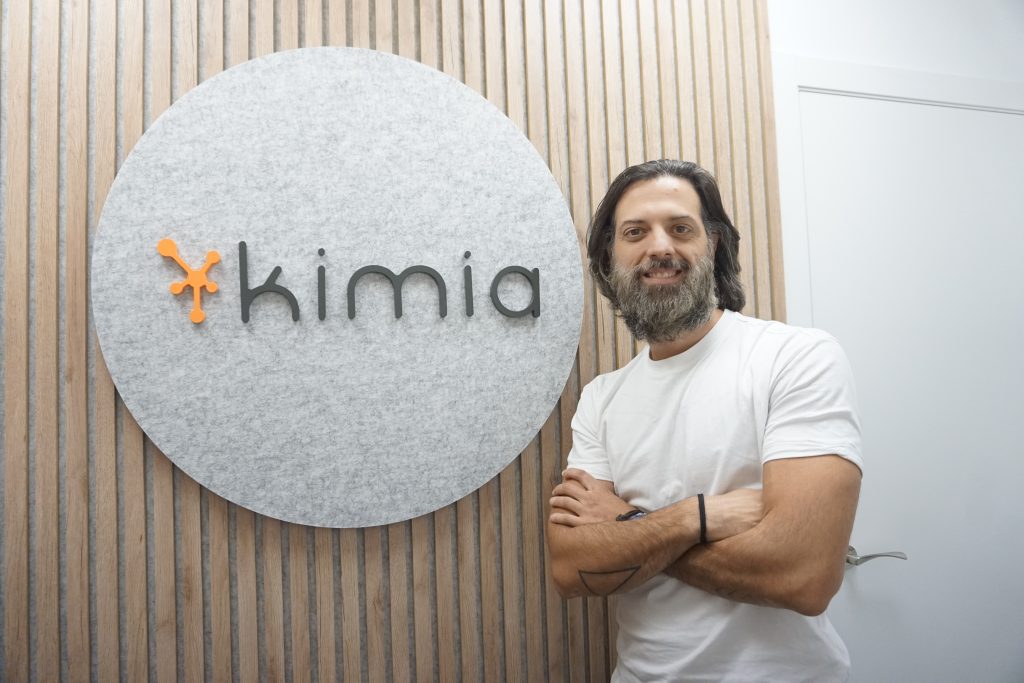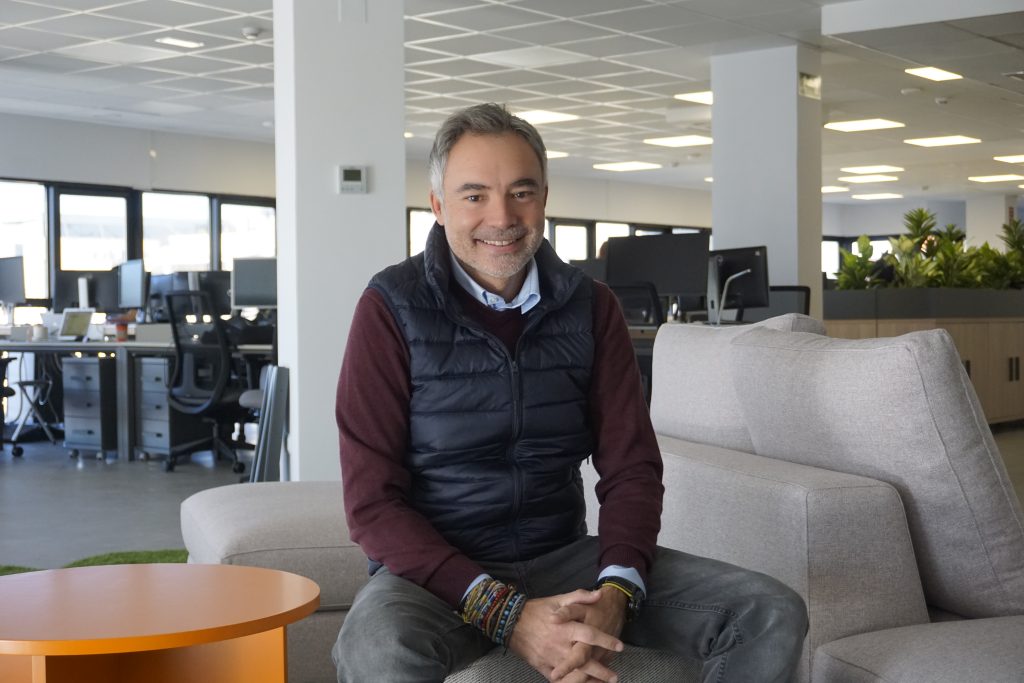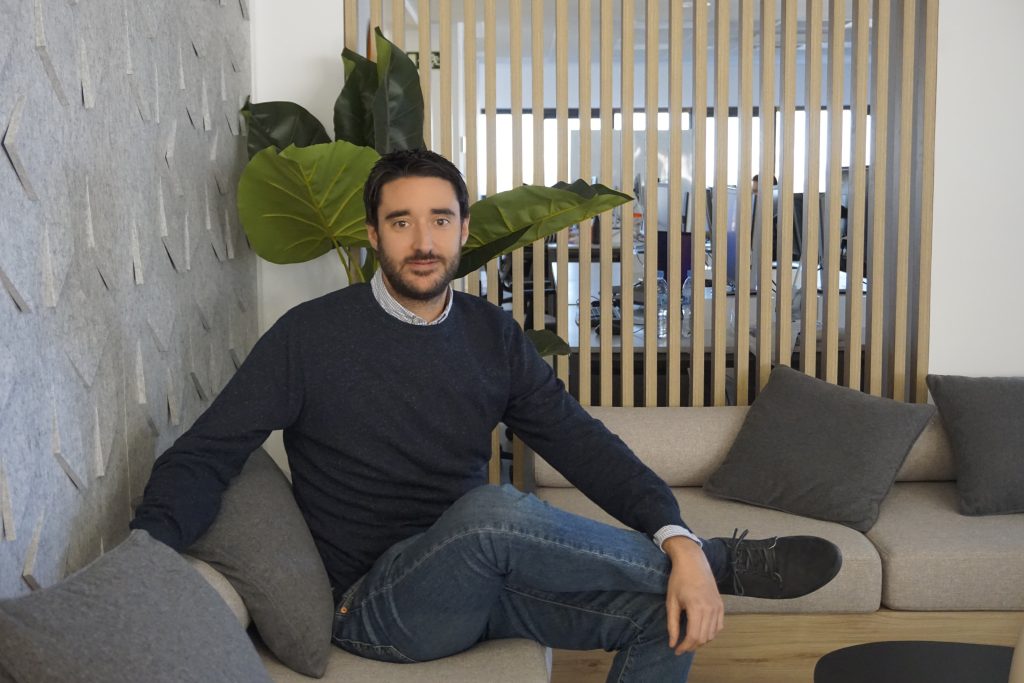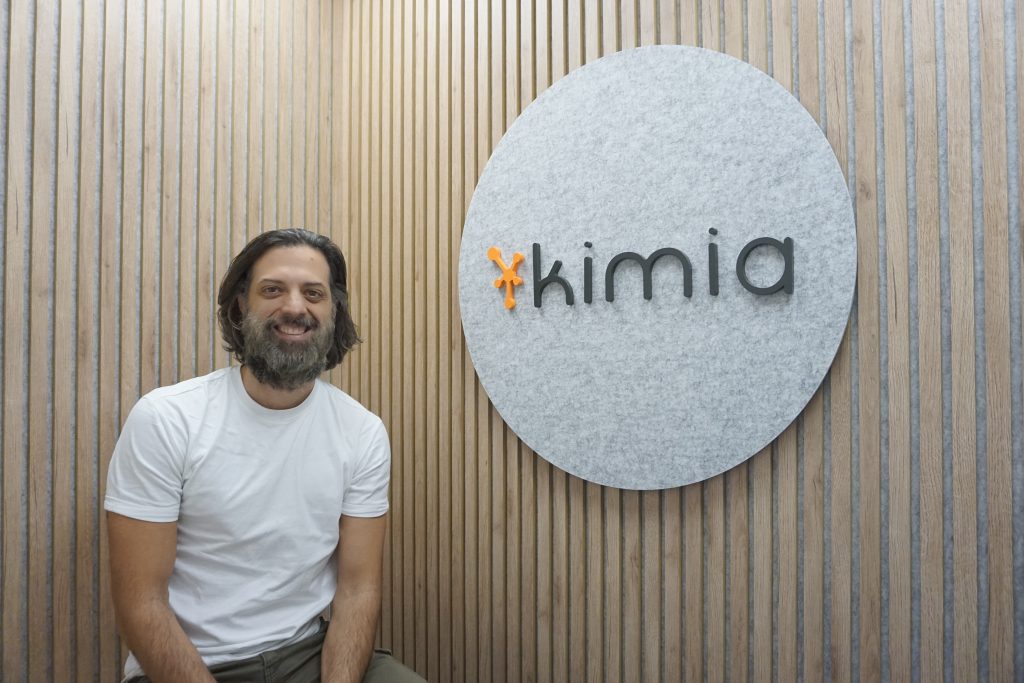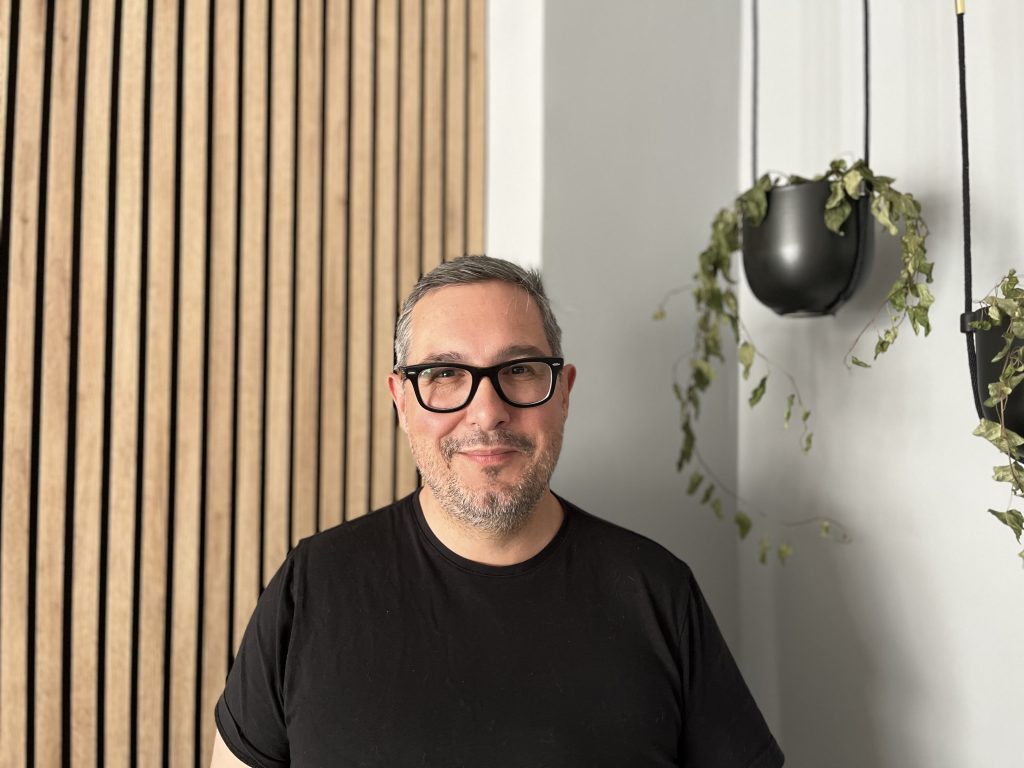
“I could work in Kimia all my life”, that’s what Álvaro Salinas, Biddeo’s CTO, emphasizes when talking about his path within the Group.
One of our longest-serving employees, Álvaro started in Kimia 13 years ago as a programmer, when the company wasn’t even a group yet, and had its main office in a flat in the center of Madrid. Now he’s CTO of one of our most promising companies and manages a group of six “techies”.
Get to know his journey
Let’s go back in time. Before you arrived at Kimia, what had been your trajectory?
Well, I started working in 1999. My first job was assembling computers in Torrejon de Ardoz, which is where I come from, but I was quite clumsy with my hands so I wanted to do something different. I got into programming, which, at the time, was an unknown world. But it quickly grew and became more important. I found myself working for important companies even before finishing college.
And how did you end up in Kimia?
I was working at Amena [a Spanish telecom company] at the time, as Software Sharings Manager. I had been working there for five years, when I met one of Kimia’s ex-partners and one of its ex-co-owners, shortly after its foundation. They came to Amena as consultants and eventually asked to interview me for Kimia.
Suddenly I was programming from a flat, developing mobile applications for the first smartphones on the market.
How do you remember that time?
It was very dynamic! From working a lot in apps we went to portals, and all that meant a lot of money for the whole company. But then, because of the regulations that started being passed, our profits dropped severely. Many of my colleagues left Kimia.
Throughout my years here we’ve seen very high highs, and very low lows, always adapting and changing. And that taught me what today I think is my best quality: I may not be the most intelligent or the most creative person in the room, but I adapt really really quickly to whatever change comes my way.
And how did you end up in Biddeo?
Time passed and eventually, Kimia got to a point where it became clear that it should become a group of companies rather than just one big company, to also position itself in markets outside of Spain. One of the first steps to get there was acquiring another company, and so Kimia acquired Msales.
Msales was a lot of work, and I started feeling a bit misplaced, like my time at Kimia was possibly coming to an end.
It’s true that I didn’t have vision at the time, I couldn’t see that Kimia was evolving into what it is today. I just wanted to leave. But I spoke to Iván [Carrillo, the Group’s Managing Partner] and Charly [Molina, CINO] and they had a cool project going on. It wasn’t even a company yet, they just wanted to improve this software they had in Tidart that optimized video campaigns, and they could use my help.
I jumped in and it turned out to be the best thing I ever did: it was like changing jobs without changing jobs.
So then what?
I became Tidart’s CTO and started developing the software that would later become Biddeo’s software. It was just a whisper at the time, kind of like a Tidart spin-off, but it was very exciting: we saw that we could optimize videos better than everyone else. So that made us realize that an independent company could be created from it. So Biddeo came to be and they turned me into its CTO as well.
Around eight months later I left Tidart to dedicate myself exclusively to Biddeo and other ad tech development projects. Tidart also needed exclusive attention that I couldn’t give, so we hired Estefanía [Morales, the agency’s CTO], and that was one of the best hires we ever did.
The Biddeo tech: building LAIA
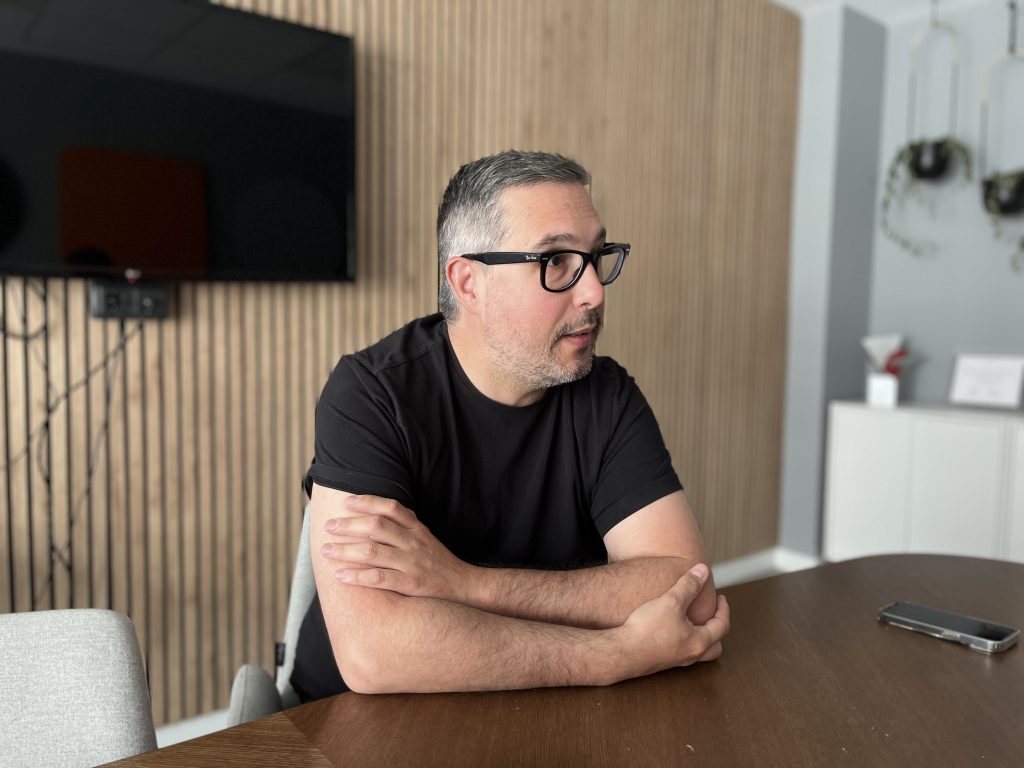
Getting into Biddeo’s technology, how did it start?
We’ve always used, and keep using, Python as our programming language, but, in the beginning, it’s true that we had a very simple technology that has actually become a bit obsolete for what we need Biddeo’s platform to do nowadays.
The thing is, at Biddeo we manage large volumes of data. At first, it was fine to just monitor them for tendencies and insights, but, now, we really need to read that data. The only way to read it, being such a large volume, is through AI.
And that’s crazy. I never thought that I’d be working with artificial intelligence, but since we figured out that these systems can do much more than just create statistics – learn from videos, understand and isolate the elements of a photo – programming becomes a no-brainer. It’s something truly amazing, and also a bit scary.
What are you currently working on, then?
Right now, besides the normal flow of work here in Biddeo, we’ve been working for a few months now on LAIA. As you know, Biddeo’s main business line is to optimize video campaigns to make them more visible on the Internet with the best prices. Nowadays, companies want to be present on the Internet, but in a “gourmet”, surgical way.
Before if we would just get a video campaign and insert it in every video, but now advertisers want their ads to be featured in specific kinds of videos or don’t want them to show up in other types, but we can’t do that manually, it would take forever. That’s where LAIA comes in: she classifies and categorizes all of YouTube’s videos based on their description and what is said in their comment section. With that, we’re able to place a company’s ad exactly where they want it.
So, for example, if you’re selling shoes for kids, you might want your campaign to show in videos for children set outdoors. But let’s suppose that in one of them someone breaks their leg, that might not work for the advertiser anymore, we can filter that.
Does it have any similarity with ChatGPT?
Yes, they’re both language based. ChatGPT reads the internet to give you any and all kinds of answers, it’s like the sun, it’s huge. Our tool only reads YouTube and is much more precise.
And why is it called LAIA?
“La IA” [in Spanish, The AI]. Charly [Molina] and Diego [Rayón, Biddeo’s CCMO] came up with it.
Would you say that LAIA is the work of your life?
I mean, at least in terms of importance and scale it is. But, the truth is that, years ago, I spent four hours one night developing a system that divided information we collected between two databases because one alone couldn’t handle all the volume. I did it super fast, without really knowing what I was doing, after a long day of work, and we ended up using that system for four or five years. Although it didn’t have the same quality as other databases made by specialists in the matter – which I am not -, the fact that I did it in one night, exhausted, and that, not only it saved our day, but also ended up working for five years, was one of the coolest things I have ever made.
It’s true that LAIA is awesome, I even told my family about it, but I’ve made lots of really cool stuff in Kimia.
We already know that LAIA is the next big step for Biddeo but, what are the company’s long-term plans?
Well, we are in the process of internationalizing Biddeo, making it available for the whole world but with an emphasis on being close to the client, very much like a multi-tenant company. We just opened an office in Miami which is slowly growing so we are going in the right direction. Also, we hope to, at some point, get our hands on Smart TVs and streaming services.
If we get super ambitious, what would you like Biddeo to become?
Biddeo should grow into being the best ad tech in the world.
The Biddeo team
Let’s talk about the team behind Biddeo. Since you are mainly an ad tech company, are there more technology-focused people or…?
Well, it’s surprising, because not all of our members are tech-related. In our team, we have data scientists and programmers, as one would expect, but we also have people whose profiles are not exactly technological. We have a journalist, for example, who specializes on text processing and who is educating and training LAIA. I never thought I’d have these kinds of people in my team but I must say that it’s invigorating.
Your team knows you for your motto: “Taller towers have fallen”. Could you talk about that?
During all these years I’ve been in Kimia, I’ve seen us make a lot of money with a lot of clients, and I’ve seen it all vanish. That’s what the motto references to: I try to keep my feet on the ground even during times of success because I’ve seen bigger projects turn into dust in just a flick of an eye. I’ve seen taller towers fall.
Have you ever flipped that coin? That you’ve come out of deeper holes?
Yeah, but the Biddeo team consists of that type of really optimistic and happy people, so I’m the pessimist who balances it out.
Final thoughts
Now that you’ve told us everything, if you looked back on your journey, how would you think of it. You’ve been in Kimia for 13 years, it’s the job you’ve had the longest in your life, why?
Truth is at Kimia I feel at home. I’m not saying it’s perfect all the time, nothing is, but here I get to work with friends that have helped me when I needed to, in my job and in my personal life. We say that this is a family and it’s true.
I know that one day I won’t be here anymore, and if they decide at some point that it’s my time to leave, then I’ll accept it, but for now, this is a safe space for me, where I can be myself, where I can learn, work with an amazing team, get over the bad days together…
So, why 13 years? I mean, why not 20? I could work at Kimia all my life.
This chat is part of a series of interviews with our team. Click here to check out all of them so far.
